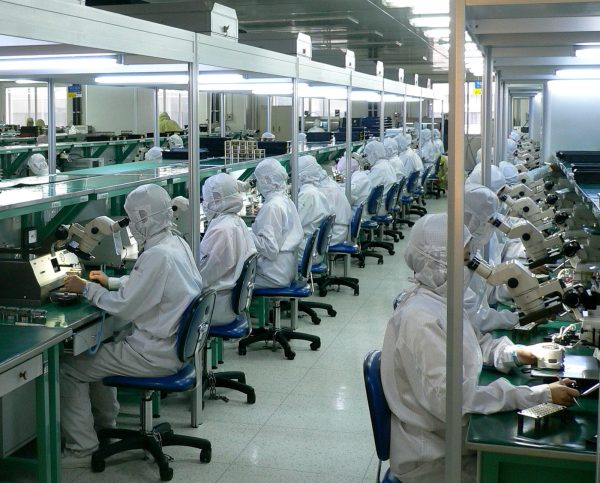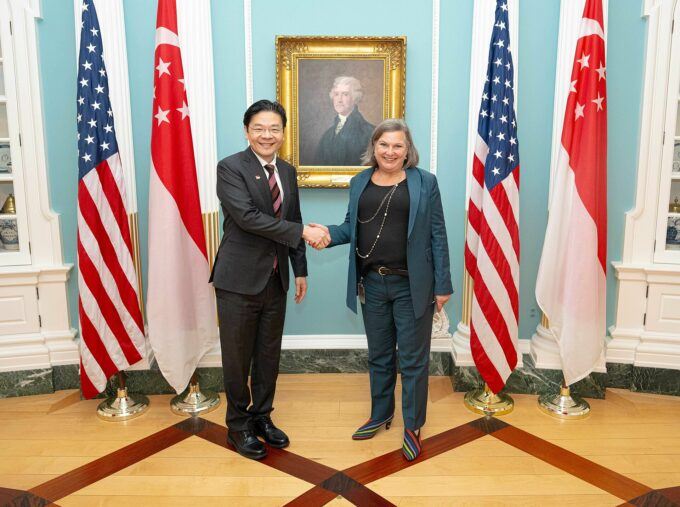(RIGHT WING)Libertarians argue that capitalism is superior to socialism because in capitalism anyone is free to do anything — including start a worker cooperative. In truth, capitalism constrains our options, while socialism can liberate us to live as we please.
By Ben Burgis

Oshawa is a small Canadian city on the shoreline of Lake Ontario. It was also the hometown of the late left-wing Canadian politician Ed Broadbent, who would go on to become the national chairman of the New Democratic Party, or NDP.
In Broadbent’s youth, a major employer in Oshawa was a glass manufacturer called Duplate, Ltd. When the Duplate plant closed in the 1960s, Broadbent was disturbed. Several decades later, in his book Seeking Social Democracy: Seven Decades in the Fight for Equality, Broadbent recalled the way the incident influenced his thinking about workers’ rights:
As I recall, there were about 300 workers directly affected by the management’s decision to relocate their Oshawa plant to another part of the province — and when you included their family members and the impact on neighbouring companies, the number of people actually affected by the closure was around 1200 in total. . . . So here you had hundreds of workers, some of whom had invested 30 or 40 years of their lives in Duplate, being profoundly affected by a decision they had played absolutely no part in — and a profitable company that packed up and moved just to make higher profits. . . . Their human dignity was denied outright.
This kind of story is precisely what leads many of us to conclude that capitalism is a profoundly unjust system. Broadbent himself was a practical politician focused on devising progressive reforms within the existing system. But while more immediate reforms like Broadbent’s are good and important, our long-term horizons shouldn’t stop there.
Capitalism is a system under which the means of production can be bought and sold by private individuals, and anyone who can’t afford to start a business of their own has to submit themselves to the domination of those who can if they want to make a living. Workers spend eight out of every sixteen waking hours most days of the week in workplaces that are run like totalitarian dictatorships — and it’s only eight hours, and only most days of the week, because of victories won over generations of workers’ struggles.
If the comparison to totalitarian dictatorships seems hyperbolic, it shouldn’t. In fact, capitalists often regulate far more intimate aspects of workers’ behavior — especially for relatively “unskilled” workers without much bargaining power — than do the laws of a typical totalitarian dictatorship. Employers frequently tell workers, for example, when they have to smile, when they’re allowed to talk to each other, and when they’re allowed to go to the bathroom.
For many libertarians, none of this adds up to a legitimate complaint about capitalism or a reason to want to violate the property rights of big capitalists like Jeff Bezos — by, for example, nationalizing their businesses and putting them under the management of the workers themselves, representatives of the broader community, or some combination of the two. They argue instead that capitalism is already, in the words of the libertarian philosopher Robert Nozick, a “framework of utopias.”
In his book Anarchy, State, and Utopia, Nozick argues that the laissez-faire version of capitalism is already the best kind of utopia — a “meta-utopia.” Want a socialist utopia where workers control their own workplaces? No problem, he says. The rules of even a radically deregulated form of capitalism already let you start one up!Libertarian philosopher Jason Brennan sums up Nozick’s point in his book Why Not Capitalism? this way:
There is an essential asymmetry in the capitalist and the socialist visions of utopia. Capitalists allow socialism, but socialists forbid capitalism.
Libertarians like Nozick think that this permissiveness is what makes capitalism better. Are they right?
A Framework of Utopias
When Nozick lays out this argument in the final chapter of Anarchy, State, and Utopia, he starts from the highly reasonable premise that “people are different.” Therefore no detailed prescription for how people should individually and collectively live their lives will provide the best kind of life for everyone.
That’s true. Different people have wildly varying attitudes toward religion, monogamy, work, play, and damn near everything else, and a good society should allow for wide-ranging pluralism about what people think is the best life and how they want to pursue it. Democratic socialists agree.
Nozick is also right that some utopian writers, such as St Thomas Moore or various pre-Marxist “utopian socialists,” erred in painting pictures of life in the future that didn’t allow for this kind of desirable pluralism. A good society should have room for single-family houses inhabited by big Catholic families who all get up together to go to early-morning mass and polyamorous Wiccan compounds.
But what exactly follows from this about workplaces and the distribution of economic resources?
In a short section of an earlier chapter (“Workers’ Control”), Nozick says that for socialists whose objection to capitalism is that workers have to follow the orders of bosses who aren’t democratically accountable to them, “an easy way to give workers access to the means of production” is for groups of workers to simply “buy machinery, rent space, and so on, just as a private entrepreneur does.” He suggests various means by which capital could be secured, such as through convincing unions to invest their pension funds.
If these businesses were as profitable or more profitable than traditional firms, he suggests, it should be no problem to secure such funding or even funding from more traditional private investors. If they were less profitable, perhaps socially conscious consumers could be induced to support them for political reasons. And if they don’t, Nozick thinks, the failure of a worker-owned sector to flourish can’t be a symptom of any sort of injustice.
Insinuating that this hasn’t happened because workers don’t actually want to democratically control their workplaces, Nozick muses that it’s “illuminating to consider why unions don’t start new businesses, and why workers don’t pool their resources to do so.”
Real Cooperatives and Collective Action Problems
We don’t have to speculate a priori to address the question of worker cooperatives. There are many thousands of them all over the world, and extensive research has been conducted on them. The worker-owned Mondragon Corporation, for example, was founded decades before Nozick wrote those lines, and today it’s the biggest business in the Basque region of Spain. So it’s very far from true that no groups of workers have had this idea.
But the germ of truth in Nozick’s speculation is that, in every actually existing capitalist economy, the worker-cooperative sector is microscopic. Mondragon’s eighty thousand worker-owners make it an imposing behemoth by the standards of other worker co-ops. Still, it’s a rounding error next to the tens of millions of Spaniards employed by traditional capitalist firms.
Many libertarians take this as evidence that workers simply don’t care about having a say in what goes on in their workplaces. If they did, they’d be leaving their current employers in droves to start new cooperatives or join old ones. The libertarian economist Gene Epstein, for example, made great hay of this argument in a series of debates he did with Jacobin editor Bhaskar Sunkara, Marxist economist Richard Wolff, and me.
But it’s a strange argument in many ways. For starters, it’s not obvious that the path to establishing a cooperative economy should run through worker co-ops outcompeting capitalist firms. Instead, mechanisms like union organizing at the workplace and building socialist political parties can accomplish socialist objectives much more effectively by democratically conquering political power. These are arguably far smarter strategies for achieving socialist ends than trying to outcompete capitalists.
To grasp this point, consider that the wages of low-wage workers are more likely to be raised by putting a proposition on the ballot in your state to raise the minimum wage than by exhorting people to only buy from companies that pay their lowest-paid workers a good wage, even though voters and consumers are the same people. The former strategy often succeeds, even in red states. The latter has never succeeded and never will.
One of the things libertarians who push these arguments choose to ignore is the existence of collective action problems, especially under capitalism. There are often situations where Option A would benefit everyone in a group if they all opted for it, but where the dynamics of the situation will make it unlikely for everyone to do so individually, and so it might be in the best individual interests of every member of the group to go with Option B instead. A classic example is the Prisoners’ Dilemma, described here.
Our economic lives are governed by capitalist rules that allow for concentrated individual power. Consequently, anyone whose motive for starting a co-op would simply be to have a better life than they would have as an employee has every incentive to shoot the moon and try to become an employer. The infant mortality rate for businesses of all kinds is extremely high, and getting a new enterprise off the ground — whether collectively owned or otherwise — takes an enormous amount of work. Why all do that on the slim hope of having a somewhat better position at a worker co-op instead of holding out for the — perhaps even slimmer, but also much more enticing — hope of having a much better life by building a miniature economic kingdom where you get to be the king?
These problems alone mean that socialist ideologues are much more likely than workers primarily motivated by their own individual interests to be involved in attempts to start co-ops. And socialist ideologues are likely to make the entirely reasonable calculation that their time and effort would have more impact on the overall shape of society if they spent it doing things like organizing unions at large employers, or campaigning for socialist candidates, rather than working ten hours a day to get some local cooperative coffee shop up and running.
Added to these already considerable obstacles, though, there’s a problem with financing. Worker co-ops are by their nature typically going to be started by groups of people with relatively limited means. They can’t reward investors with ongoing ownership shares without, to whatever extent they do this, losing their character as worker co-ops. And groups of working-class people are often a risky bet for loan officers working for banks. There are of course those union pension funds Nozick calls our attention to, but even if they didn’t have a responsibility to look out primarily for good investments for their members’ retirements rather than prioritizing ideological goals, Nozick presumably wasn’t foolish enough to think union pension funds investing in co-ops would be sufficient to create an economy dominated by co-ops.
Worse yet, if you could somehow get an economy where worker-owned firms dominated (but the ground rules of capitalist markets were unchanged), the result wouldn’t automatically be a stable form of market socialism. Even if you asked a magical genie to instantaneously restructure every existing firm to put it under the collective ownership and democratic control of its workforce, without changing anything else about the structure of the economy, the result would be an arrangement that market forces would eventually course-correct back into something recognizable as regular old capitalism.
Whether capitalist or worker-owned, firms inevitably go out of business, and the people who once worked there need new jobs. Co-ops looking to expand operations and increase the income of existing members have an incentive to hire new workers as regular employees rather than co-owners, and people who have been out of work for a while have an incentive to accept this reduced status. And whole co-ops would often be incentivized to move toward reverting to regular capitalist firms by selling ownership stakes to other, more successful co-ops or particularly successful individuals.
This doesn’t mean a democratic form of socialism where workers’ control is the norm isn’t possible or superior. But it does mean that, to realize that vision, we need to use the state to scrap the rules of the capitalist market, where ownership of the means of production is up for sale to the highest bidder, and build new socialist institutions instead.
Lots of socialists have written about what that might look like. Sunkara, for example, lays out how such institutions might work in the first chapter of his book The Socialist Manifesto (“A Day in the Life of a Socialist Citizen”). Socialist economist Mike Beggs dug into the technical details in an article last year for Jacobin. And the three of us are working on a book about it (The Blueprint) for Verso.
The Deeper Problem
When people ask why socialists, if they want workers’ control, don’t just start worker-owned firms — as Epstein likes to say in debates, his voice dripping with derision, if that’s what you want, “go for it” — they’re really saying two things. And the superficial plausibility of their argument comes from the ambiguity.
Their first argument is that if people really wanted workplace democracy, they’d have long ago gotten it by starting worker co-ops and outcompeting capitalists within the rules of regular capitalist markets. But that makes no more sense than saying that if voters in a state that’s passed a ballot measure to raise the minimum wage really wanted it, they’d achieve it in libertarian-approved ways by only buying products from firms that paid high wages.
Their second argument is that starting worker-owned firms within capitalism and trying to outcompete capitalism is the only morally legitimate method of achieving workplace democracy. But why should we believe that?
You can say it’s morally wrong because people are entitled to whatever they can get in a free market, but as an argument against socialism that just begs the question. Socialists believe that what everyone is morally entitled to is a roughly equal share of society’s resources and a say in decisions that profoundly impact their lives.
If you still don’t see why “why don’t you just outcompete capitalists within capitalist markets” is a silly question, think about why abolitionists didn’t just buy up all the slaves and free them, or why small-r republicans in the eighteenth century didn’t just put all their efforts into convincing the heir to the throne to voluntarily give more power to parliament.
Part of the answer is that these wouldn’t have been very effective strategies. But another part of the answer is that early modern republicans didn’t just want more power for parliaments. They disputed kings’ right to rule. Abolitionists didn’t just want more people to be free. They rejected slave owners’ property rights. And socialists don’t just want workers to have power. We fundamentally object to the idea that the means of production should be for sale to whoever can afford them — and thus the power to fundamentally impact the lives of many other people, as in the decision to move the factory from Oshawa that so disturbed a young Ed Broadbent.
Nozick says that while it’s easy to see how worker-owned factories could appear under capitalism, it’s harder to see how “private enterprise” could get a toehold in a “state system” of democratic socialism. But this shouldn’t be hard for him to see. It should be easy. All it would take is convincing most voters to support privatizing a factory or two. It’s illuminating to wonder why Nozick found that prospect so terrifying.
Socialism Is the Real Framework for Utopias
Again, it’s absolutely true that people are different, and the best kind of life for one person isn’t the best kind of life for another. But that doesn’t mean that we need to privatize some large businesses for the sake of people who have a fetish for being told what to do by an oligarch.
Instead, to create a society with the most pluralism possible along the most dimensions possible in practice, we need to meet everyone’s material needs and give everyone a meaningful say over what happens in their workplaces and how revenue is distributed. This would enhance everyone’s practical capacity to live whatever kind of life they want.
It’s all well and good to say that people can live in single-family houses with white picket fences and take their ten children to mass with them every morning or they can live in polyamorous communes. But in a society where people are overworked, overstressed, and have trouble making rent in their cramped apartments — and having ten children is about as practical a possibility for them as buying their own factory — the fact that they aren’t legally prohibited from pursuing any of these visions of a good life doesn’t add up to a much of a framework for utopias.
Libertarianism and socialism both evolved historically from Enlightenment liberalism. The idea that pluralism is desirable and it’s good to let people experiment with whatever forms of life they’d like is in both philosophies’ DNA. The difference is that socialists are realistic enough to know what every graduate student in the sciences knows: that being given permission to run an experiment isn’t worth much if their laboratory isn’t funded.





